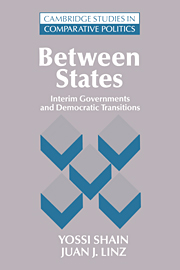Book contents
- Frontmatter
- Contents
- Preface
- Contributors
- PART ONE THEORY
- Introduction
- 1 Provisional governments: Revolutionaries and moderates
- 2 The power-sharing model
- 3 The caretaker government model
- 4 The international interim government model revisited
- 5 The timing and nature of first democratic elections
- 6 Conclusions
- PART TWO CASE STUDIES
- Index
1 - Provisional governments: Revolutionaries and moderates
Published online by Cambridge University Press: 05 August 2012
- Frontmatter
- Contents
- Preface
- Contributors
- PART ONE THEORY
- Introduction
- 1 Provisional governments: Revolutionaries and moderates
- 2 The power-sharing model
- 3 The caretaker government model
- 4 The international interim government model revisited
- 5 The timing and nature of first democratic elections
- 6 Conclusions
- PART TWO CASE STUDIES
- Index
Summary
When a regime has been superseded in a revolutionary struggle (frequently violent) or a coup d'état, the new ruling elite claims to break completely with the old order. It usually declares itself a provisional government, thereby indicating its intention to lead a democratic transition via free elections within a short period of time. Many revolutionary provisional governments are the initial successors of personalized sultanistic regimes which leave little if any room for moderate opposition. Sultanistic systems lack recognized and reliable rules of political opposition or action, are uncommitted ideologically, have no institutionalized procedures for succession, and are dominated by personal ties and attributes. Despite their official fidelity to legality they tend to practice de facto a state of legal anomie within a system completely devoid of checks and balances.
In the postwar era the lawlessness of many sultanistic regimes was augmented by international support provided to their rulers due to their role in the Cold War rivalry between the United States and the Soviet Union. In Latin America personalized sultanistic dictatorships were frequent and in more recent times included the family-based rule of the Somoza dynasty, the Duvaliers, particularly Baby Doc, Trujillo, and Batista. Postcolonial Africa also produced many such despotic and corrupt rulers who in their “megalomaniacal pursuit of wealth and power … plundered or squandered their nations' coffers, leaving their people to endure lives fraught with privation, fear and hopelessness.”
- Type
- Chapter
- Information
- Between StatesInterim Governments in Democratic Transitions, pp. 28 - 40Publisher: Cambridge University PressPrint publication year: 1995



